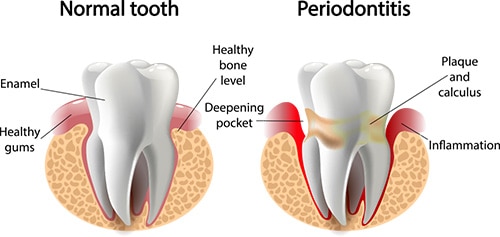
If you’ve ever had itchy gums, a cavity or noticed that your gums bleed when brushing, it could be a sign of periodontal disease, also known as gum disease or gingivitis. This highly common dental issue affects millions of people every year and is best treated in its earlier stages. Give Dr. Salesky and his team a call at (860) 628-5029 to schedule a timely visit for preventive dentistry in Southington.
Gum disease originates in the gums, where infections form from harmful bacteria and other materials left behind from eating. Gingivitis is the medical term for early gum disease, or periodontal disease. In general, gum disease can be caused by long-term exposure to plaque, the sticky but colorless film on teeth that forms after eating or sleeping.
Patients with gum disease may not know they have it until they notice more concerning symptoms. Symptoms of gum disease include the following:
In many cases, however, gingivitis can go unnoticed. The infections can eventually cause the gums to separate from the teeth, creating even greater opportunities for infection and decay. If gingivitis goes untreated, more serious problems such as abscesses, bone loss or periodontitis can occur.
From irritated or itchy gums to more serious symptoms such as loose teeth or tooth loss (signs that gum disease has advanced to periodontal disease) the best way to resolve a dental problem is to seek professional dental care.

Periodontal exams are vital in the maintenance of your oral health as they are used to assess the health of your gums and teeth. They can help your dentist diagnose gum diseases, gingivitis and periodontitis. These exams can also reveal receding gums, exposed roots, tooth grinding and other problems, making periodontal exams vital to maintaining proper oral health. Regular dental exams are important as they can reveal evidence of gum disease in its early stages.
During your periodontal examination, your dentist will check:
Gingivitis, the first stage of periodontal disease, causes inflammation of the gums. Dental x-rays can determine if the inflammation has spread to the supporting structures on the teeth so treatment can be started to correct the problem. Periodontitis occurs when gingivitis goes untreated, which makes periodontal exams vital to preventing and putting an end to gum diseases.
Some cases of acute periodontal (gum) disease that do not respond to more conventional treatment and self-care such as flossing may require a special kind of cleaning called scaling and root planing.
The procedure begins with administration of a local anesthetic to reduce any discomfort. Then, a small instrument called a “scaler,” or an ultrasonic cleaner, is used to clean beneath your gum line to remove plaque and tartar.
The root surfaces on the tooth are then planed and smoothed. If effective, scaling and root planing helps the gums reattach themselves to the tooth structure. Additional measures may be needed if the periodontal pockets persist after scaling and root planing.
Your bone and gum tissue should fit snugly around your teeth. When you have periodontal disease, supporting tissue and bone is destroyed, forming “pockets” around the teeth. Over time, these pockets become deeper, providing a larger space for bacteria to thrive and wreak havoc. As bacteria accumulate and advance under the gum tissue in these deep pockets, additional bone and tissue loss follows. Eventually, if too much bone is lost, the teeth will need to be extracted.
Flap surgery is sometimes performed to remove tartar deposits in deep pockets or to reduce the periodontal pocket, making it easier for you or your dental professional to keep the area clean. This common surgery involves lifting back the gums and removing the tartar. The gums are then sutured back in place so that the tissue fits snugly around the tooth again.
A pocket reduction procedure is recommended if daily at-home oral hygiene and a professional care routine cannot effectively reach these deep pockets. In some cases, irregular surfaces of the damaged bone are smoothed to limit areas where disease-causing bacteria can hide. This allows the gum tissue to better reattach to healthy bone.
Gum disease and periodontitis have been linked to health risks affecting the rest of the body, such as poor cardiovascular health, risk of stroke or Alzheimer’s, and pregnancy issues such as low birth weight. In addition, pregnancy has been known to cause a form of gingivitis. This has been linked to hormonal changes in a woman’s body that promote plaque production.
Do your part to support better oral and overall health by practicing good dental hygiene, and coming in to see the dentist for a routine dental checkup and teeth cleaning.
Patients who keep up with 6-month checkups, and who brush and floss regularly have a higher chance of preventing or reducing symptoms of gum disease. But no matter your current dental condition, Dr. Salesky and his team are prepared to care for you with gentle dentistry in a judgement-free environment.
As your local dentist in Southington, we’re honored to provide quality restorative dentistry with gentle root canal therapy, dental crowns, dental implants and more. Whether you need a dental crown, bridge or custom denture, finding the best dental treatment for your needs starts with a visit to your local family dentist serving Southington, Bristol, Plantsville and nearby. Give our team a call at (860) 628-5029 to schedule an appointment or drop by Southington Dentistry at 15 Cornerstone Ct #3A, Plantsville, CT 06479. See you soon!

Proudly Serving Plantsville, Milldale, Marion, Bristol, Plainville, New Britain, Berlin, and surrounding cities in Connecticut